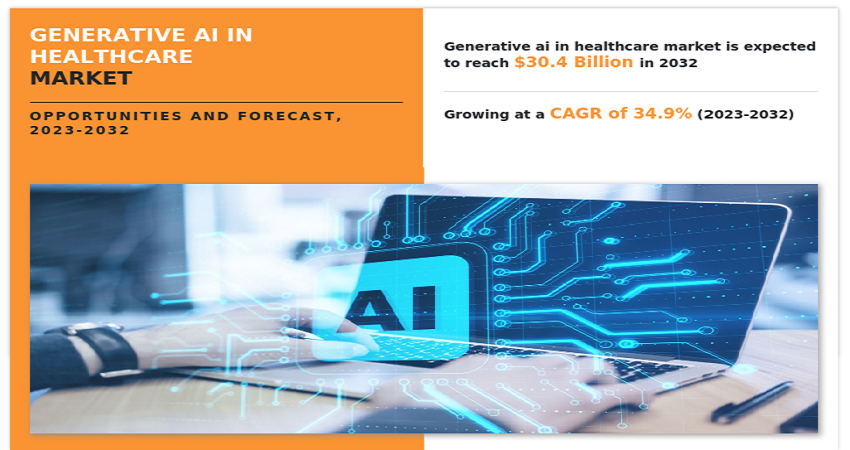Generative AI – Pioneering Breakthroughs in Healthcare Innovation

Generative AI refers to a class of artificial intelligence that creates new data instances, such as images, text, or other content, rather than simply recognizing patterns in existing data. It utilizes models, like GPT-3, to generate content that resembles human created data, showcasing the ability of the machine to understand and mimic various aspects of human creativity and intelligence.
Generative AI plays a crucial role in healthcare by contributing to various aspects of medical research, diagnostics, and treatment. Here are some detailed roles –
- Drug discovery –
- Generative AI assists in the discovery of new drugs by stimulating molecular structures, predicting their properties, and identifying potential drug candidates. This accelerates the drug development process.
- Medical imaging –
- Generative models enhance medical image processing, aiding in tasks like image reconstruction, denoising, and even generating synthetic medical images. This improves the accuracy of diagnoses and enables better visualization.
- Data augmentation –
- Generative AI can generate synthetic medical data which is useful for augmenting limited datasets. This helps in training more robust machine learning models, especially in scenarios where acquiring large datasets is challenging.
- Personalized medicine –
- By analyzing vast datasets, generative models can contribute to the development of personalized treatment plans, taking into account individual patient characteristics and genetic information.
- Natural language processing (NLP) –
- Generative models like GPT-3 can assist in analyzing and summarizing vast amounts of medical literature, aiding researchers and healthcare professionals in staying updated with the latest advancements.
- Virtual health assistants –
- Generative AI can power virtual assistants that engage with patients, answer queries, and provide information about symptoms, medication, and treatment options, enhancing patient engagement and education.
- Disease prediction and early detection –
- By analyzing patient data, including electronic health records, generative models can contribute to predicting disease risks and detecting potential health issues at an early stage, facilitating preventive measures.
- Clinical trials optimization –
- Generative AI helps optimize clinical trial designs, identifying suitable patient populations, predicting outcomes, and improving the efficiency of the trial process.
- Rehabilitation and mental health support –
- AI powered systems can generate personalized rehabilitation exercises and provide mental health support by analyzing user inputs, offering therapeutic interactions and monitoring emotional wellbeing.
While these applications show great promise, it’s essential to address ethical considerations, data privacy, and the need for regulatory frameworks to ensure responsible and secure implementation in healthcare.
In addition, Generative AI has made significant advancements in the field of healthcare, which in turn has boosted the growth of the global generative AI in healthcare market to a great extent. According to a report published by Allied Market Research, the global generative AI in healthcare market size is registered to reach $30.4 billion from 2023 to 2032.
North America is currently dominating the market with the highest market share. This is attributed to a large base of key players, surge in geriatric population, and advanced healthcare infrastructure. The Asia-Pacific region, at the same time, is expected to witness the fastest growth rate during the forecasted period.
Diagnostic assistance has emerged as a major driving factor. Generative models such as generative adversarial networks (GANs) & convolutional neural networks (CNNs) have been employed to enhance the accuracy and efficiency of diagnosing diseases from X-rays, MRIs, and CT scans. They enable the creation of high quality realistic medical images, aiding in data augmentation for training robust image recognition models and improving the performance of diagnostic tools.
Moreover, the ongoing collaborations between technologists, healthcare professionals, and policymakers are essential to harness the full potential of generative AI while maintaining the highest standards of safety, transparency, and patient centric care. As generative AI continues to evolve, ongoing research and development will likely bring forth more sophisticated applications, contributing to improved healthcare outcomes and the overall efficiency of medical processes.
To conclude, generative AI represents a transformative force in healthcare, offering unprecedented advancements in various critical areas. From accelerating drug discovery and enhancing medical imaging to enabling personalized treatment plans and real time diagnostics, the impact of generative AI is profound. As technology continues to evolve, the potential for improving patient outcomes, optimizing clinical workflows, and ushering in a new era of precision medicine becomes increasingly promising.
Author’s Bio – Suchita Gupta is an explorer, musician and content writer. While pursuing MBA, she found that nothing satisfies her more than writing on miscellaneous domains. She is a writer by day, and a reader by night. Besides, she can be found entertaining her audience on social media platforms. Find her on LinkedIn & Instagram.
